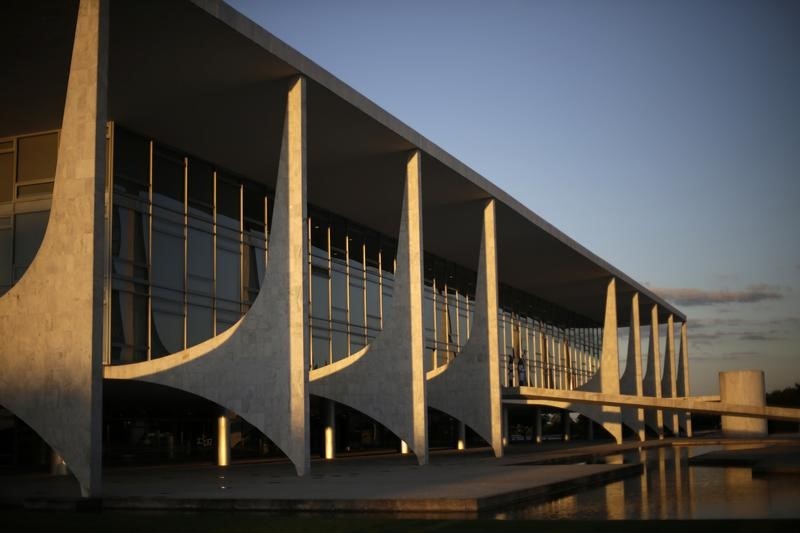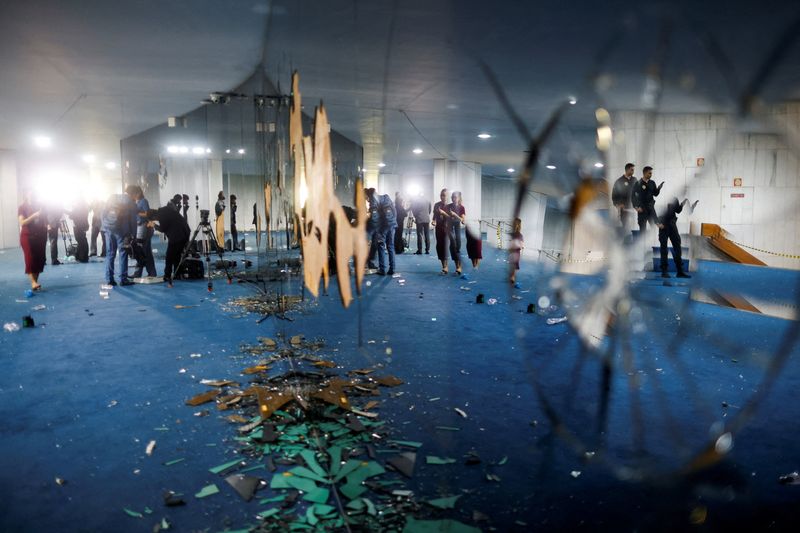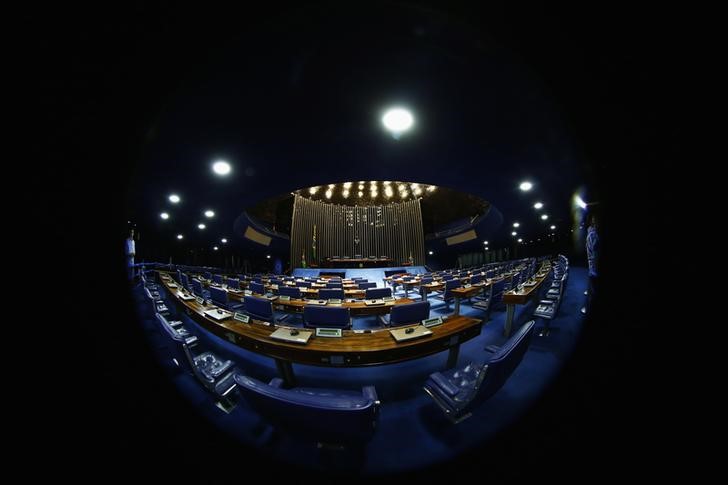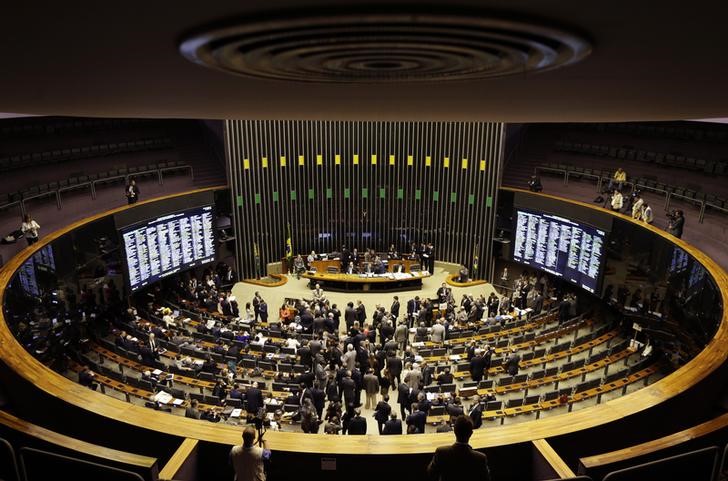A cluster of tents had sprung up on the University of Houston’s central lawn. Draped in keffiyehs and surrounded by a barricade of plywood pallets, students stood on a blue tarp spread over the grass. Tensions with administrators were already high before students pitched their tents, with incidents like pro-Palestine chalk messages putting university leaders on high alert.
What the students didn’t know at the time was that the University of Houston had contracted with Dataminr, an artificial intelligence company with a troubling record on constitutional rights, to gather open-source intelligence on the student-led movement for Palestine. Using an AI tool known as “First Alert,” Dataminr was scraping students’ social media activity and chat logs and sending what it learned to university administration.
This is the first detailed reporting on how a U.S. university used the AI technology to surveil its own students. It’s just one example of how public universities worked with private partners to surveil student protests, revealing how corporate involvement in higher education can be leveraged against students’ free expression.
This is the final installment in an investigative series on the draconian surveillance practices that universities across the country employed to crack down on the 2024 pro-Palestine encampments and student protests. More than 20,000 pages of documentation covering communications from April and May 2024, which The Intercept obtained via public records requests, reveal a systematic pattern of surveillance by U.S. universities in response to their students’ dissent. Public universities in California tapped emergency response funds for natural disasters to quell protests; in Ohio and South Carolina, schools received briefings from intelligence-sharing fusion centers; and at the University of Connecticut, student participation in a protest sent administrators into a frenzy over what a local military weapons manufacturer would think.
The series traces how universities, as self-proclaimed safe havens of free speech, exacerbated the preexisting power imbalance between institutions with billion-dollar endowments and a nonviolent student movement by cracking down on the latter. It offers a preview of the crackdown to come under the Trump administration as the president re-entered office and demanded concessions from U.S. universities in an attempt to limit pro-Palestine dissent on college campuses.
“Universities have a duty of care for their students and the local community,” Rory Mir, associate director of community organizing at the Electronic Frontier Foundation, told The Intercept. “Surveillance systems are a direct affront to that duty for both. It creates an unsafe environment, chills speech, and destroys trust between students, faculty, and the administration.”
At the University of Houston, the encampment was treated as an unsafe environment. University communications officials using Dataminr forwarded the alerts — which consist of an incident location and an excerpt of the scraped text — directly to the campus police. One alert sent by Dataminr to a University of Houston communications official identified a potential pro-Palestine incident based on chat logs it scraped from a semi-private Telegram channel called “Ghosts of Palestine.”
“University of Houston students rise up for Gaza, demanding an end to Genocide,” the chat stated. First Alert flagged it as an incident of concern and forwarded the information to university officials.
According to Dataminr’s marketing materials, First Alert is designed for use by first responders, sending incident reports to help law enforcement officials gather situational awareness. But instead of relying on officers to collect the intelligence themselves, First Alert relies on Dataminr’s advanced algorithm to gather massive amounts of data and make decisions. In short, Dataminr’s powerful algorithm gathers intelligence, selects what it views to be important, and then forwards it to the paying client.
A follow-up public records request sent to the University of Houston returned records of more than 900 First Alert emails in the inbox of a university administrator, only in April 2024.
The AI company has been implicated in a number of scandals, including the domestic surveillance of Black Lives Matter protesters in 2020 and abortion rights protesters in 2023. The Intercept reported in April that the Los Angeles Police Department used First Alert to monitor pro-Palestine demonstrations in LA. First Alert is one, but not the only, service that Dataminr offers. For newsrooms to corporate giants, Dataminr’s powerful algorithms power intelligence gathering and threat response for those willing to pay.
“It’s concerning enough when you see evidence of university officials scrolling through individual student social media, that’s going to chill people’s speech,” said Nathan Wessler, deputy director of the ACLU’s Speech, Privacy, and Technology Project. “But it’s a whole other level of concern when you start contracting with these companies that are using some kind of algorithm to analyze, at scale, people’s speech online.”
The University of Houston and Dataminr did not respond to multiple requests for comment.
While the University of Houston leaned on Dataminr to gather intelligence on the student-led movement for Palestine, it is just one example of the open-source intelligence practices used by universities in the spring of 2024. From screenshots of students’ Instagram posts to the use of on-campus surveillance cameras, the documents obtained by The Intercept illustrate how the broadening net of on-campus intelligence gathering swept up constitutionally protected speech in the name of “social listening.”
University communications officials were often left to do the heavy lifting of hunting down activists’ social media accounts to map out planned demonstrations. Posts by local Students for Justice in Palestine chapters of upcoming demonstrations were frequently captured by administrators and forwarded on. In other cases, university administrators relied on in-person intelligence gathering.
One set of communication in the documents suggests that at one point, University of Connecticut administrators were watching the students in the on-campus encampment sleep. “They are just beginning to wake up. It’s still very quiet. Just a couple of police cars nearby,” a UConn administrator wrote to other officials that April.
U.S. universities, faced with the largest student protest movement in decades, used open-source intelligence to monitor the student-led movement for Palestine and to inform whether or not they would negotiate, and eventually, how they would clear the encampments. Emily Tucker, the executive director of the Center on Privacy and Technology at Georgetown Law, situated the development as part of the broader corporatization of U.S. higher education.
“ Institutions that are supposed to be for the public good are these corporate products that make them into vehicles for wealth extraction via data products,” Tucker told The Intercept. “Universities are becoming more like for-profit branding machines, and at the same time, digital capitalism is exploding.”
At UConn, the relationship between the corporate world and higher education led to a brief panic among university administrators. After protesters, including members of UConn’s chapter of Students for Justice in Palestine and a campus group called Unchained, blocked access to a military aircraft manufacturing facility about 25 miles from campus, administrators went into a frenzy over what the military contractor would think.
“Ok. The P&W CEO is pretty upset with us about it right now and is pressing [University President] Radenka [Maric] for action,” wrote Nathan Fuerst to Kimberly Beardsley-Carr, both high-level UConn administrators. “Can you see if UConn PD can proactively reach out? If we can determine that no UConn Students were arrested, that would be immensely helpful.”
Fuerst was referring to a contractor for the Israeli military called Pratt & Whitney, a subsidiary of the $235 billion company formerly known as Raytheon — and a major UConn donor. Both UConn and Pratt & Whitney denied that the request occurred, pointing out that the military contractor has no CEO. Fuerst, Beardsley-Carr, and Maric did not respond to requests for comment.
 Photo Illustration: Fei Liu / The Intercept
Photo Illustration: Fei Liu / The Intercept Beardsley-Carr, in her own email sent four minutes after Fuerst’s, repeated the request: “As you can see below, the President is getting pressure from the CEO of Pratt and Whitney.”
Whether the company made the request or if it was, as UConn spokesperson Stephanie Reitz told The Intercept, “a misunderstanding,” it’s clear from the communications that UConn administrators were concerned about what the weapons manufacturer would think — and sprang to action, gathering information on students because of it.
Pratt & Whitney has donated millions of dollars to various university initiatives, and in April 2024, the same month as the protest, it was announced that a building on campus would be rededicated as the “Pratt & Whitney Engineering Building.” A partnership between the school and the company received an honorable mention from the governor’s office, prompting a Pratt & Whitney program engineer to write in an email: “It’s wonderful! P&W and UCONN have done some great things together.”
After a flurry of emails over the Pratt & Whitney arrests, on April 25, the UConn administrators’ concerns were lifted. “Middletown PD provided me with the names of the 10 individuals arrested during the below incident. None of the arrestees are current students,” UConn Police Lieutenant Douglas Lussier wrote to Beardsley-Carr.
“You have no idea how happy you just made me,” Beardsley-Carr wrote back.
It’s not just UConn, but U.S. higher education as a whole that has a deep and long-standing relationship with military weapons manufacturers. Whether it is endowed professorships, “Lockheed Martin Days,” defense industry presence at career fairs, or private donations, the defense industry has a hold on U.S. higher education, especially at elite universities, which serve as training grounds for high-paying and influential careers.
“These universities are the epicenter, the home base, of the future generation of Americans, future policy makers,” said Tariq Kenney-Shawa, Al-Shabaka’s U.S. Policy Fellow. If universities “were so confident in Israel’s narrative and their narrative being the correct one,” Kenney-Shawa added, “they would let that debate in such important spaces play out.”
Some students who spoke with The Intercept emphasized that as a result of the surveillance they encountered during the protests, they have stepped up their digital security, using burner phones and limiting communication about potential demonstrations to secure messaging channels.
“ The campus is waiting and watching for these kinds of things,” said Kirk Wolff, a student at the University of Virginia who said he was threatened with expulsion for a one-man sit-in he staged on campus and expressed fear that university administrators would read his emails.
The surveillance had a “chilling effect,” in his experience, Wolff said. “ I had so many people tell me that they wanted to join me, that they agreed with me, and that they simply could not, because they were scared that the school would turn over their information.”
The University of Virginia did not respond to a request for comment on Wolff’s claims.
The surveillance detailed in this investigation took place under the Biden administration, before Trump returned to power and dragged the crackdown on pro-Palestine dissent into the open. Universities have since shared employee and student files with the Trump administration as it continues to investigate “anti-Semitic incidents on campus” — and use the findings as pretext to defund universities or even target students for illegal deportation.
Any open-source intelligence universities gathered could become fair game for federal law enforcement agencies as they work to punish those involved in the student-led movement for Palestine, Mir noted.
“A groundwork of surveillance has been built slowly on many college campuses for decades,” he said. “Now very plainly and publicly we have seen it weaponized against speech.”
Research support provided by the nonprofit newsroom Type Investigations.

 German (DE)
German (DE)  English (US)
English (US)  Spanish (ES)
Spanish (ES)  French (FR)
French (FR)  Hindi (IN)
Hindi (IN)  Italian (IT)
Italian (IT)  Portuguese (BR)
Portuguese (BR)  Russian (RU)
Russian (RU) 





:strip_icc()/i.s3.glbimg.com/v1/AUTH_59edd422c0c84a879bd37670ae4f538a/internal_photos/bs/2023/l/g/UvNZinRh2puy1SCdeg8w/cb1b14f2-970b-4f5c-a175-75a6c34ef729.jpg)










Comentários
Aproveite ao máximo as notícias fazendo login
Entrar Registro